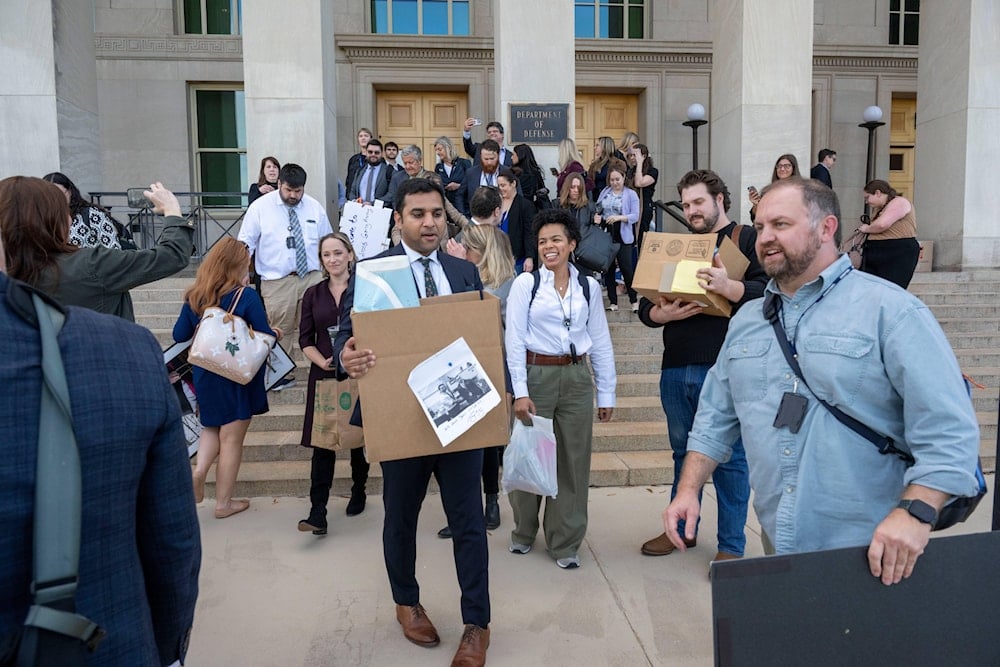Pentagon journalists vacate workspaces as new restrictions take effect
At least 30 news outlets reject new Pentagon press rules seen as threats to press freedom, prompting journalists to return credentials and leave offices.
-

Members of the Pentagon press corps carry their belongings out of the Pentagon after turning in their press credentials, on October 15, 2025, in Washington. (AP Photo/Kevin Wolf)
Dozens of reporters covering the US War Department vacated their Pentagon offices and returned their press credentials on Wednesday after the enforcement of new Pentagon press restrictions. The move followed a deadline on Tuesday set by the Department, requiring journalists to sign a new access policy or risk losing their workspaces and credentials.
At least 30 news organizations, including Reuters, refused to sign the revised policy, citing serious concerns over press freedom and the ability to cover the US military independently.
The new rules require journalists to acknowledge that their press credentials can be revoked if they ask Pentagon employees to disclose classified or certain types of unclassified information. Reporters who violate the policy may be labeled as security risks.
As the deadline passed, the Pentagon press area was described as unusually silent. Journalists began removing furniture, servers, soundproofing materials, and other equipment. "I’ve never seen that place not buzzing like a beehive," said JJ Green, national security correspondent at Washington’s WTOP, who turned in his credential on Wednesday.
Television outlets were given until Friday to remove their broadcast equipment.
Press freedom concerns intensify
The Pentagon Press Association, representing over 100 news organizations, issued a strong rebuke of the new policy, calling it "A dark day for press freedom that raises concerns about a weakening US commitment to transparency in governance, to public accountability at the Pentagon and to free speech for all."
Traditionally, credentialed reporters have had access to unclassified areas of the Pentagon and worked across the hall from the press office, allowing frequent contact with department spokespeople. Press badges indicate that reporters have already passed background checks.
"We’ve never been allowed to just bolt right on into classified areas or people’s offices," said Stephen Losey of Defense News, adding, "I don’t know anybody who would purposely eavesdrop... which is what some people have made it seem like we’re doing."
Read next: Is the Trump admin going after the media industry?
Chief Pentagon spokesperson Sean Parnell defended the policy earlier in the week, "The policy does not ask for them to agree, just to acknowledge that they understand what our policy is. This has caused reporters to have a full-blown meltdown, crying victim online. We stand by our policy because it’s what’s best for our troops and the national security of this country."
Some journalists pointed out the hypocrisy of the security concerns, noting that sensitive conversations don’t happen in public spaces. "The irony of irony is that Pentagon reporters are not having conversations about controlled information in the hallways," said a member of the Pentagon Press Association. "We’re doing it over [the encrypted app] Signal."
The new access restrictions are part of a broader tightening of media control under War Secretary Pete Hegseth, a former Fox News host. Ironically, Fox News is among the outlets that refused to sign the new policy. While the War Department maintains the rules are necessary for national security, critics argue they mark a serious retreat from long-standing US commitments to transparency and a free press.
Leading outlets refuse to sign
On Monday, The Washington Post joined The New York Times, CNN, The Atlantic, The Guardian, Reuters, Associated Press, NPR, HuffPost, and Breaking Defense in declining to sign the agreement
Matt Murray, executive editor of The Washington Post, said the policy contradicts constitutional guarantees of press freedom. "The proposed restrictions undercut First Amendment protections by placing unnecessary constraints on gathering and publishing information," Murray wrote in a statement on X. "We will continue to vigorously and fairly report on the policies and positions of the Pentagon and officials across the government," Murray added.
The Atlantic, which earlier this year clashed with Pentagon and White House officials after its editor, Jeffrey Goldberg, was mistakenly added to a private Signal chat, said it “fundamentally” opposed the new restrictions. A statement from The New York Times described the policy as a direct attempt to curb transparency. “The new policy constrains how journalists can report on the US military, which is funded by nearly $1 trillion in taxpayer dollars annually,” it said.
“The public has a right to know how the government and military are operating,” NYT’s Washington bureau chief Richard Stevenson added.

 4 Min Read
4 Min Read










